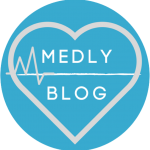We are Emily and Aydin. We are both fourth year medical students at the Hull York Medical School. This past summer, we spent some time at the refugee camp, Camp Petra, in Katerini, Greece, as volunteers of the organisation Borderfree Association. Here is a glimpse of our experiences.
Camp Petra is a refugee camp, out of the town, hills and hills away from the bustling centre of Katerini. It wasn’t possible to get to the camp without a car or a map, and no one could enter without a pass. In a closed box, in the middle of nowhere, lived 1500 Yazidis. At least they were safe now…
Most of them came from Iraq. They told us they had to pay strangers, just for the promises they made. Seven thousand dollars per person and MAYBE a car would show up to take them somewhere safe. It is traditional to have large families, ten, fifteen, maybe more, so they couldn’t afford to take everybody. They often had to leave people behind.
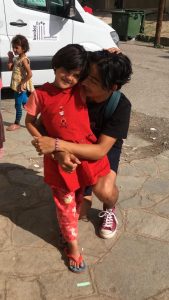 Cimo told us about her dad. She was six years old and she had the most contagious laugh. She said her dad was somewhere, Germany maybe? Half of his arm and leg was missing. She didn’t know how or why. We didn’t get to say goodbye to Cimo; she just disappeared on the last day. We can only hope she found her father.
Cimo told us about her dad. She was six years old and she had the most contagious laugh. She said her dad was somewhere, Germany maybe? Half of his arm and leg was missing. She didn’t know how or why. We didn’t get to say goodbye to Cimo; she just disappeared on the last day. We can only hope she found her father.
Vian was 11 years old and she had the biggest eyes and an even bigger brain. She had only been learning English since she arrived at the camp, seven months prior, and she was already proficient in speaking and reading. Her one hour of school in cramped and noisy conditions didn’t do justice to the things she could achieve if she had been born as lucky as us. We heard horror stories about the old camp: children being kidnapped every day; women giving birth in dirty tents; people fighting; people dying.
The clinic was no more than one van and two doctors. One tired doctor lived with us volunteers, working long days in the heat. She carried bags of donated medicine to the camp, every day. Medicine in different languages, medicine never heard of, much of it expired. The lines kept getting longer and the people more desperate and angry. They couldn’t look after everyone.
Bassi, paralysed after a car accident, suffered tremendous back pains. She couldn’t make it to the doctor. She never left her tent and she couldn’t properly shower. Volunteers visited to feed her appetite for learning but we weren’t able to fix the unfairness of it all. We wanted to build a shower for her close to her tent, but there was a ‘No’ from someone at every step.
We had never felt this useless before. There was a huge array of organisations in the camp, all with volunteers full of so many plans to improve the situation. So how come every day looked like yesterday?
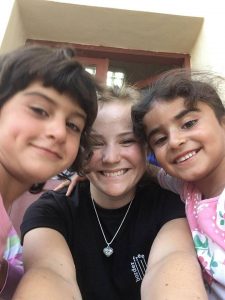
What we both remember most are the faces of the children. There were so many children. Children everywhere. Faces of friends. We promised every day that we would come back the next day. On the last day, we lied. They had already had to say so many goodbyes in their lives and we were just two more.
The refugees had the biggest hearts. People with nothing invited us to their tents for food every day. We didn’t speak the same language, but we learnt as much as we could. We didn’t talk about the bad things. They taught us Kurdish numbers, colours and food. We talked a lot about food. We talked about where they wanted to go and when they could go back to school. They showed us pictures of their homes and families. They were still smiling. The women needed a hairdresser at the camp, and we talked about that. It was a big deal when it was built! Football and volleyball tournaments were taking place, and we even got to watch the championship match.
When we were leaving, there was talk of shutting the camp down. Winter is coming, and the tents are just not good enough for survival in the biting mountainous climate.
It is so easy to get carried away with our lives and forget about the 1500 left behind in the camp and the millions more we see on the news every day. They taught us far more than we gave them. We can only promise to keep fighting for them now and hope that they can one day rebuild their lives.
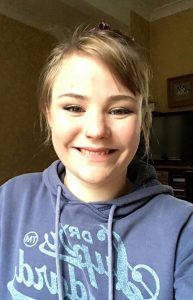 Emily Westlake is a fourth year medical student, currently intercalating in Global Health at the University of Bristol. Her interests include travelling, mixed martial arts, and reading. She plans on pursuing a career in Global Health.
Emily Westlake is a fourth year medical student, currently intercalating in Global Health at the University of Bristol. Her interests include travelling, mixed martial arts, and reading. She plans on pursuing a career in Global Health.
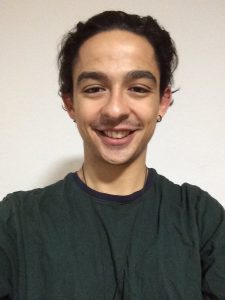 Aydin Koksal is a fourth year medical student, currently intercalating in Clinical Anatomy at the University of Hull. His interests are travelling, music, and arts.
Aydin Koksal is a fourth year medical student, currently intercalating in Clinical Anatomy at the University of Hull. His interests are travelling, music, and arts.
